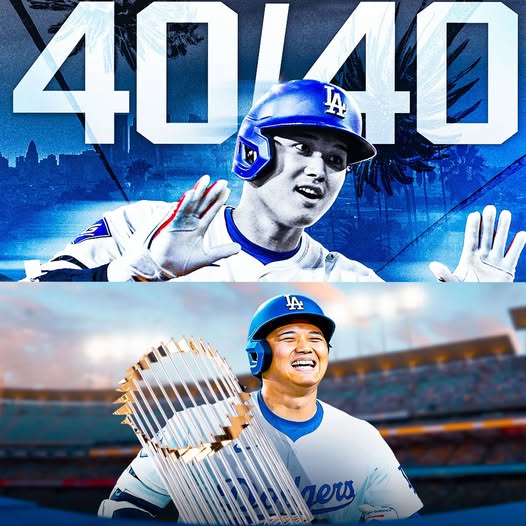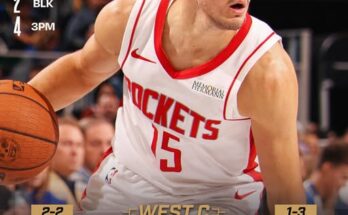Shohei Ohtani has officially launched himself into Los Angeles Dodgers history, smashing his 40th home run of the season and doing it at a pace no player in the franchise’s storied past has ever matched. In a single, thunderous swing, Ohtani not only cleared the outfield wall but also rewrote the team’s record books, becoming the fastest Dodger to reach the 40-homer mark. As the ball rocketed into the stands, Dodger Stadium exploded with cheers, a wave of electricity surging through the crowd. In that moment, it wasn’t just another home run — it was a statement, a reminder that Ohtani is not merely playing the game but redefining it, pitch by pitch and blast by blast.
Shohei Ohtani has officially launched himself into Los Angeles Dodgers history, smashing his 40th home run of the season and doing it at a pace no player in the franchise’s long, illustrious history has ever matched. It wasn’t just a swing. It wasn’t just a hit. It was a statement — the kind that echoes far beyond the chalk lines, beyond the stadium walls, and into the annals of the game’s greatest feats.
The moment itself felt like it had been building all season. Ohtani, the two-way superstar who has already rewritten baseball norms, stepped to the plate with the crowd at Dodger Stadium humming in anticipation. There’s a different kind of energy when he digs in — a blend of curiosity, reverence, and an unshakable sense that anything is possible. This wasn’t just another plate appearance in the middle of August; this was an at-bat that felt destined to be remembered.
The pitcher on the mound delivered, and Ohtani, with his signature smooth yet explosive swing, connected perfectly. The crack of the bat was sharp, unmistakable — a sound that every baseball fan recognizes as the calling card of a ball destined to fly. In an instant, thousands of heads tilted skyward, eyes tracing the arc of the ball as it sailed over the outfield grass, toward the seats, and ultimately into history.
The crowd erupted, not in polite applause, but in a wave of roars that seemed to shake the very structure of the stadium. People were on their feet before the ball even landed. It wasn’t just Dodgers fans celebrating a home run — it was baseball fans celebrating a milestone, an act of greatness in real time. The ball’s journey ended deep into the stands, but Ohtani’s sprint around the bases was the real punctuation mark. Calm, composed, and yet carrying the unspoken weight of history, he crossed home plate with the same quiet confidence he has shown all year.
This wasn’t any ordinary 40th home run. In the Dodgers’ storied history — a franchise that has seen Hall of Famers, MVPs, and legends who defined entire eras — no one had ever reached the 40-homer mark this quickly in a season. Names like Duke Snider, Gil Hodges, Mike Piazza, and Cody Bellinger have worn Dodger blue and terrorized opposing pitchers, but Ohtani has set a new pace. The stat line says “fastest to 40,” but the reality is more profound. It means that in just one season with Los Angeles, Ohtani has carved out a place among the greatest to ever wear the uniform, and he’s done it while also performing at an elite level on the mound earlier in the year before focusing solely on hitting after injury.
For Dodgers fans, this is the kind of performance that becomes a generational touchstone — the type of thing people remember decades later with the phrase, “I was there.” Kids in the stands, wearing oversized Ohtani jerseys, will grow up telling their own children about the night the two-way sensation smashed number 40 and made history. Older fans, who have witnessed the franchise’s long list of stars, will place this night alongside their most cherished memories.
The significance of the moment isn’t just statistical. Ohtani’s journey to this point makes it all the more remarkable. Coming over from Japan to join MLB, he arrived with expectations that seemed impossibly high: a player who could both pitch like an ace and hit like a middle-of-the-order slugger. Many thought the challenge was too great, that the grind of the big leagues would force him to choose one role. Instead, Ohtani didn’t just meet the hype — he obliterated it. Year after year, he has done things no modern player has attempted, let alone achieved. And now, with the Dodgers, he’s elevating his game yet again.
When Los Angeles signed him, it was hailed as one of the most significant free-agent moves in baseball history. The Dodgers didn’t just get a star — they got a phenomenon. And while Ohtani’s pitching contributions are on hold this year due to recovery from surgery, his bat alone has been worth every ounce of the investment. His offensive numbers are staggering: towering home runs, scorching doubles into the gap, and a batting approach that mixes patience with punishing contact. But it’s nights like this, with milestones on the line and the stadium packed, that crystallize why he is different.
Reaching 40 home runs faster than anyone in Dodgers history means something even deeper when you consider the legacy he is stepping into. The Dodgers are a franchise steeped in tradition — from Jackie Robinson breaking the color barrier to Sandy Koufax dominating on the mound, from the “Boys of Summer” era in Brooklyn to the powerhouse rosters of recent years. To stand out here, to set a record that eluded every other player before him, is to etch your name into one of baseball’s most enduring walls of honor.
It’s also a testament to the synergy between Ohtani and the Dodgers’ lineup. Surrounded by other stars like Mookie Betts and Freddie Freeman, Ohtani is in a batting order that offers him protection and opportunities. Pitchers can’t simply pitch around him without risking damage from the hitters behind him. But even knowing that, many pitchers have found there’s no safe way to attack him. Try to sneak a fastball by him, and it’s liable to end up 430 feet away. Hang a breaking ball, and you’ll be retrieving it from the bleachers. His 40th home run was a case study in this reality — a pitch left just a fraction too high, punished in the most emphatic way possible.
The crowd’s reaction told its own story. The roar was immediate, but it didn’t fade quickly. Even as Ohtani disappeared into the dugout, fans were still buzzing, replaying the moment in their minds, checking their phones for replays, texting friends and family. Social media lit up within seconds — videos of the home run were shared thousands of times before he even took the field again. The Dodgers’ official accounts posted highlight clips, graphics announcing the milestone, and celebratory messages. Baseball writers rushed to update their columns with the new historical footnote.
On the broadcast, commentators quickly pivoted from calling the home run to discussing its historical weight. They referenced how quickly Ohtani reached 40 compared to others, marveling at the fact that he had done so while adjusting to a new league, a new team, and a new city. They noted his OPS, his slugging percentage, his total bases — all numbers that suggest his season is on track to be one of the best offensive years in recent baseball history.
In the dugout, Ohtani was greeted by the full lineup of teammates, each offering high-fives, back slaps, and a few wide-eyed smiles. These are players who see him every day, who watch him work, and even they seemed to recognize the magnitude of the moment. Freeman was among the first to congratulate him, followed by Betts, who offered a few animated words that cameras caught but microphones missed. Manager Dave Roberts, always measured in his praise, allowed himself a rare broad grin. He knows what he has in Ohtani, and he knows that what the fans are seeing is not just a hot streak but sustained brilliance.
After the game, reporters crowded around Ohtani, as they always do when he accomplishes something extraordinary — which, for him, is often. True to form, he was humble, giving credit to his teammates, coaches, and the fans for creating an environment where he could thrive. He downplayed the personal accolade, instead emphasizing the team’s goals and the pursuit of postseason success. Yet even in his modesty, there was an unspoken acknowledgment that this was special.
The implications of this 40th home run go beyond the regular season. If Ohtani continues at anything close to this pace, he could push toward not only personal bests but franchise and even league-wide records. The idea of him reaching 50 or even 60 home runs is no longer a fantasy — it’s a legitimate possibility. That, combined with his ability to change the game in multiple ways, makes him one of the most dangerous and valuable players in the sport.
And then there’s the bigger picture. Every great sports moment carries with it the possibility of becoming a symbol — of representing something more than just the numbers in the box score. For the Dodgers, Ohtani’s 40th is a symbol of their current era: a team unafraid to invest in excellence, to chase history, to bring the best talent together and let them shine. For baseball as a whole, it’s another chapter in the story of a player who has shattered every mold, every preconceived notion of what an athlete can be.
Ohtani’s rise also underscores baseball’s global reach. That a player from Japan can come to MLB, dominate at the highest level, and become one of the sport’s most beloved figures is a testament to the game’s universal appeal. In Japan, his 40th home run was likely replayed on morning news programs, analyzed by commentators, and celebrated by fans who have followed him since his days with the Hokkaido Nippon-Ham Fighters. In Los Angeles, it will live on in highlight reels and fan memories for years to come.
As the stadium lights dimmed and fans filtered out into the night, conversations were filled with variations of the same theme: awe. People compared the blast to others they had seen, debated where it ranked among his best, speculated about how many more he might hit before the season ends. The air was still electric, the kind of lingering buzz that only follows a truly special sports moment.
Ohtani himself, likely already focused on the next game, might not dwell too long on the milestone. But for those who witnessed it, whether in person or through a screen, the 40th home run will stand as one of those moments when the game felt bigger, brighter, and more alive than usual. In a sport built on tradition and records, he had added a new one — and done it in a way that was unmistakably his own.
The numbers will tell the story on paper: “Fastest Dodger to 40 home runs.” But the memory will tell a richer one — of a warm summer night, a bat meeting ball with perfect precision, a crowd erupting in joy, and a player who continues to redefine what’s possible. Ohtani’s 40th wasn’t just history; it was a glimpse of the future, a reminder that we are watching a generational talent in his prime, capable of moments that make us forget, if only for a second, the boundaries of the sport.
And as long as Shohei Ohtani is in Dodger blue, moments like this won’t just be cherished — they’ll be expected. Because with him, history isn’t something that happens once in a while. It’s something that seems to happen every time he steps to the plate.



